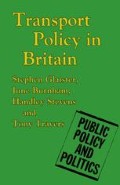Abstract
Central and local governments, Parliament and European Union institutions are formal actors in the British policy-making process, given express authority to make decisions. Trying to influence these structures of elected representative democracy are the informal actors called interest groups, pressure groups or lobbying groups. They are often divided into two categories: ‘sectional’ groups — that is, groups defending or expressing the ‘self-interest’ of their section of society, such as the Freight Transport Association (FTA), rail workers’ unions, and the Cement and Concrete Association; and ‘promotional’ or ‘cause’ groups, which promote changes in attitudes or in policies that affect the general public, such as Transport 2000, which campaigns for increased public transport provision, and Friends of the Earth, or the Royal Society for the Prevention of Accidents. However, to make rigid distinctions in interest-group politics is to miss much of the action. First, many ‘self-interested’ groups would argue they also promote the wider public interest, not only when they take up outside causes (as the RAC did over coach seat-belts), but even in promoting their own interests, if they contribute to national economic growth. to national economic growth. Second, ‘cause’ groups may be supported primarily by sections of society whose interests they promote.
Preview
Unable to display preview. Download preview PDF.
Further Reading
Alderman, G. (1984) Pressure Groups and Government in Britain (Harlow: Longman) — with many examples on transport.
Grant, W. (1995) Pressure Groups: Politics and Democracy, 2nd edn (Hemel Hempstead: Harvester Wheatsheaf).
Lukes, S. (1974) Power: A Radical View (London: Macmillan).
Marsh, D. and Rhodes, R.A.W. (1992) Policy Networks in British Government (Oxford: OUP).
Bryant, B. (1996) Twyford Down: Roads, Campaigning and Environmental Law (London: Spon) — an informed, clear analysis of how a road project was decided from the point of view of its opponents.
Wistrich, E. (1983) The Politics of Transport (Harlow: Longman).
Hamer, M. (1987) Wheels within Wheels (London: Routledge & Kegan Paul) — a polemical account of the pro-roads lobby.
Copyright information
© 1998 Stephen Glaister, June Burnham, Handley Stevens and Tony Travers
About this chapter
Cite this chapter
Glaister, S., Burnham, J., Stevens, H., Travers, T. (1998). Interest Groups and Transport Policy. In: Transport Policy in Britain. Public Policy and Politics. Palgrave, London. https://doi.org/10.1007/978-1-349-27002-6_5
Download citation
DOI: https://doi.org/10.1007/978-1-349-27002-6_5
Publisher Name: Palgrave, London
Print ISBN: 978-0-333-66124-6
Online ISBN: 978-1-349-27002-6
eBook Packages: Palgrave Political & Intern. Studies CollectionPolitical Science and International Studies (R0)

